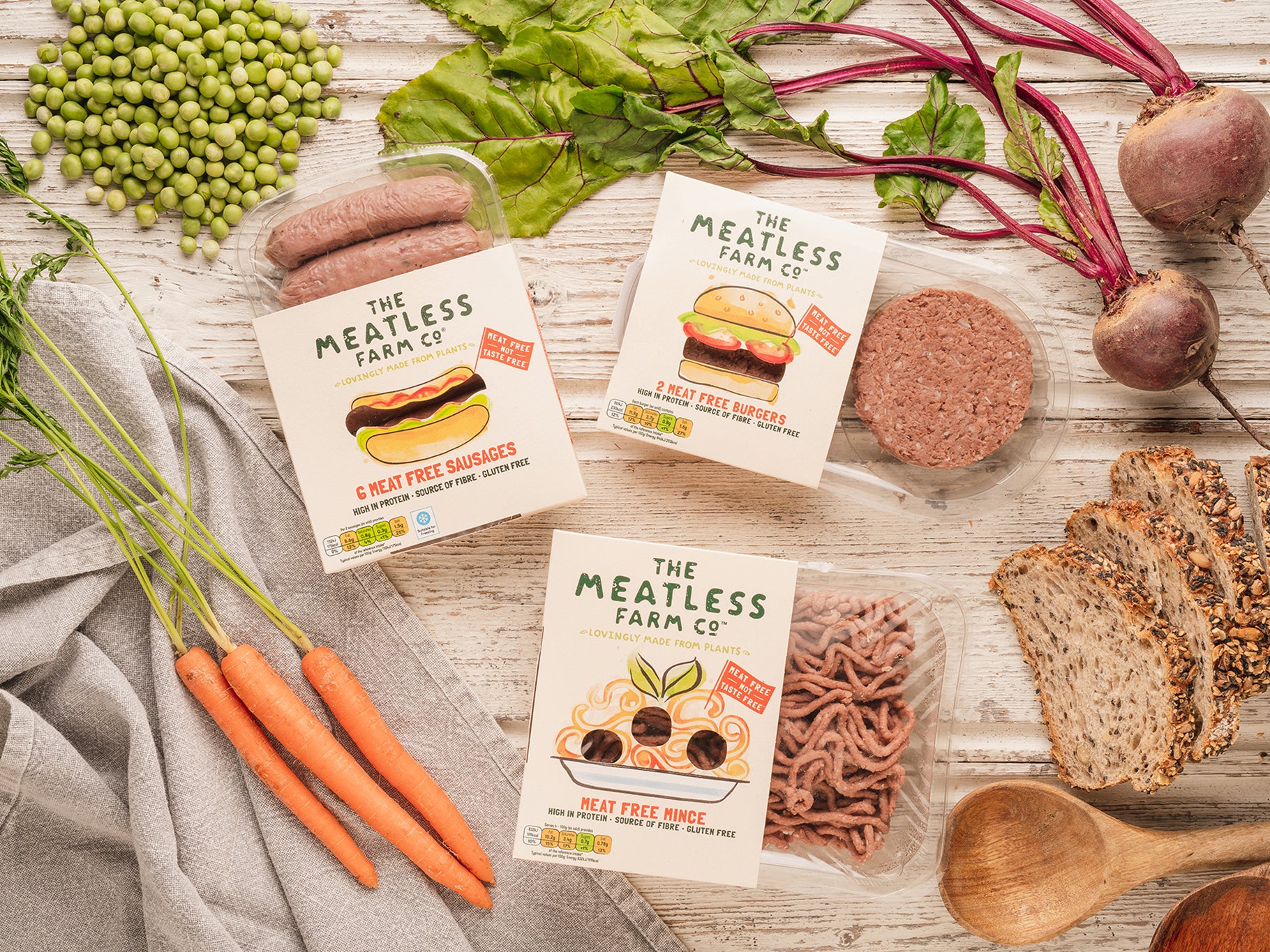‘Post-Covid, we all want to be healthier’: How vegan brand Meatless Farm is changing habits for good
Shoppers now know that what they buy and eat has a direct impact on the climate crisis – and Danish entrepreneur Morten Toft Bech is on a mission to feed that realisation, writes Zlata Rodionova


Morten Toft Bech isn’t likely to make the jump to a vegan diet anytime soon.
The founder of plant-based food brand Meatless Farm believes in a more moderate, flexitarian approach.
He tells The Independent: “If you make a big effort, cook a leg of lamb for dinner and I am invited to your house, I’ll have a little bit of meat. I have a relaxed approach to it and my goal is not to kill the meat industry.
“What we need to do is move to a more sustainable way of growing meat. We can’t feed seven billion people with protein from animals and do it seven times a week.”
According to the Danish entrepreneur, over the past four years shoppers have connected the fact that what they buy and eat has a direct impact on the climate crisis – and he’s now on a mission to change their habits for good.
“More consumers are willing to give Meatless Farm products a go – but what we want to see is more people going back and buying it again and again, instead of falling back into their old habits," he says before adding, “We’re not about not drinking at all in January, what we’ll say to our customers is drink in January, but drink less, and then continue the same path for the rest of the year. That’s what we want to achieve with meat.”
His strategy has been successful so far.
He first got inspired to launch Meatless Farm in 2015 after his wife became frustrated over the fact that she couldn’t find healthy alternative meat products to feed their small children.
“Back then, there wasn't any products that would quickly give you the same nutritional profile as 500g of mincemeat.
“We had to mix different beans and lentils and so forth, in order to meet the right nutritional equivalent for our kids. It was my wife who suggested that I should try to develop a product to fill the gap.”
Although he had a background in tech investment, Bech had never worked in the food industry. He approached a research lab in Reading to ask for help on developing a healthy plant-based mincemeat.
“I was quite naive, in the sense that I had no idea if you could make meat products out of plants. It was more of a ‘let’s see where this goes’ approach, but at the end the product was quite good and we took it from there.”
Since its launch in 2016, Meatless Farm has secured distribution deals in all four major UK supermarket chains – Tesco, Sainsbury’s, Morrisons and Asda – as well as at Whole Foods Markets in the US.
In the UK, it sells a 400g pack of meat-free mince for £2.50 and packs of two burgers for £2.50 each, as well as a 300g pack of six meat-free sausages for £2, with more products to come soon.
The company employs 100 workers over four different offices in Leeds, Amsterdam, New York and Singapore.
And at a time when businesses are struggling to survive a pandemic that brought many established firms to their knees, Meatless Farm closed a funding round raising $31m (£24m) from new and existing investors in September.
Bech says fundraising will support his ambitious global growth plans as markets emerge from Covid-19 with the aim to “build back better”.
What we need to do is move to a more sustainable way of growing meat. We can’t feed seven billion people with protein from animals and do it seven times a week
Meatless Farm sells its products to both retailers and food service providers (the company has recently secured partnerships with Itsu and Wadworth among others), which meant that the impact of the coronavirus pandemic wasn’t as brutal as for other businesses.
While sales in the food service category have been slow to recover in the US and UK markets, the company’s retail sales jumped 179 per cent year on year in the 12 weeks to July, with over a third of Britons saying they have eaten more plant-based food during lockdown.
“That gives us some indications that consumers post-Covid are coming out strong with a message of living healthier,” Bech says.
“The biggest challenge was really to understand how to build a business in that context. We were in a peculiar situation because we have a business that’s growing fast and at the same time we suddenly couldn’t move or do anything. We got worried about our supply chain and about our factories but we’ve been lucky that there were no incidents.
“But the general trend is that we are selling more and, interestingly, the supermarkets are coming back, asking for bigger variety of products. We are definitely seeing a bright future ahead, not only for Meatless Farm, but also for any plant-based food business in general.”
His proudest achievement remains the fact that his children – now aged nine, eight and three – all enjoy his products.
“I’m really happy to see my kids eat it at home because it was for them that I set the whole thing up. When you live in a world where we talk about what we eat all the time, I get worried because I don’t want to sit and preach to them. But that’s also where I think my view of being more balanced towards the whole meat debate is useful.”
If you need even more proof that plant-based eating is here to stay, Tesco this week became the first supermarket to set a five-year sales target for plant-based alternatives to meat, with the goal to provide more sustainable options to shoppers.
Meanwhile, global demand for meat-free products is anticipated to hit £4.1bn this year, up from £2.9bn in 2015, according to a report from Allied Market Research.
Bech attributes some of his success to being one of the first plant-based food brands in the UK – but he’s not afraid of competition in what is quickly becoming a crowded market, arguing that it will only secure the future of plant-based foods.
“As the plant-based products get better, the consumers will buy more and more of them, and there’s nothing better than competition to improve yourself.
“We are now at a point where we are really scaling and we are in the process of opening up in new markets. So next year the focus will be on growth.
“A personal ambition of mine would be, hopefully, to start travelling again. Not as much as we did before, but just a little bit more so we can start seeing each other again. From a company’s cultural perspective, it’s very important. I want to be able to visit our various offices, so that others can see me, talk to me and have a feel of what this company is about.”




Join our commenting forum
Join thought-provoking conversations, follow other Independent readers and see their replies
Comments